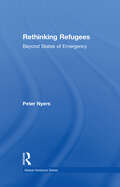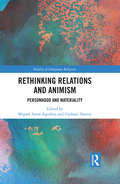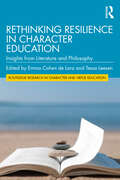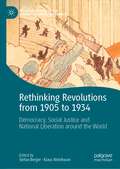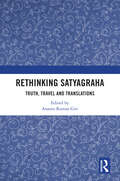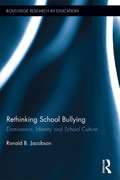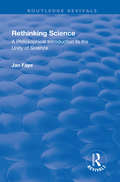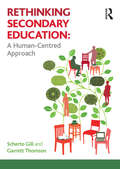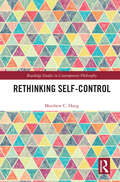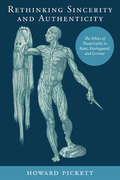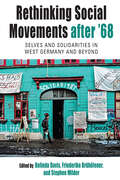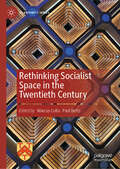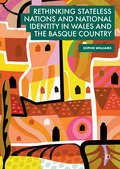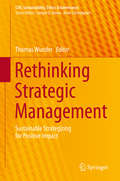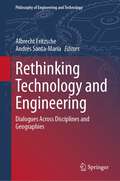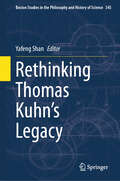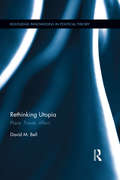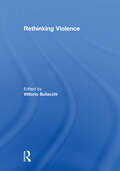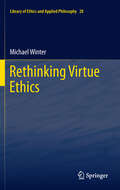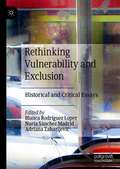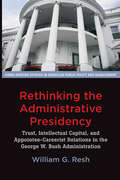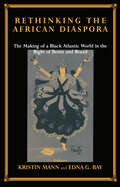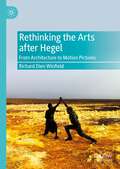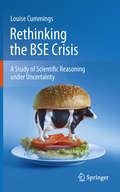- Table View
- List View
Rethinking Refugees: Beyond State of Emergency
by Peter NyersFirst Published in 2006. Routledge is an imprint of Taylor & Francis, an informa company.
Rethinking Relations and Animism: Personhood and Materiality (Vitality of Indigenous Religions)
by Graham Harvey Miguel Astor-AguileraPersonhood and relationality have re-animated debate in and between many disciplines. We are in the midst of a simultaneous "ontological turn", a "(re)turn to things" and a "relational turn", and also debating a "new animism". It is increasingly recognised that the boundaries between the "natural" and "social" sciences are of heuristic value but might not adequately describe reality of a multi-species world. Following rich and provocative dialogues between ethnologists and Indigenous experts, relations between the received knowledge of Western Modernity and that of people who dwell and move within different ontologies have shifted. Reflection on human relations with the larger-than-human world can no longer rely on the outdated assumption that "nature" and "cultures" already accurately describe the lineaments of reality. The chapters in this volume advance debates about relations between humans and things, between scholars and others, and between Modern and Indigenous ontologies. They consider how terms in diverse communities might hinder or help express, evidence and explore improved ways of knowing and being in the world. Contributors to this volume bring different perspectives and approaches to bear on questions about animism, personhood, materiality, and relationality. They include anthropologists, archaeologists, ethnographers, and scholars of religion.
Rethinking Resilience in Character Education: Insights from Literature and Philosophy (Routledge Research in Character and Virtue Education)
by Emma Cohen de Lara Tessa LeesenThis timely volume offers a nuanced reassessment and understanding of resilience through the lens of virtue ethics and character education, presenting practical strategies for the use of narratives to implement a virtue-ethical approach to resilience in classrooms.Highlighting the rich conceptual history that can be traced in a range of literary and philosophical texts, a diverse range of authors analyse what Plato, Socrates, Cicero, Augustine, Pizan, Montaigne, Weber, and Van der Heijden can teach students and teachers alike about resilience, self-reflection, and growth. The chapters provide a variety of pedagogical suggestions, discussion points, and reflection activities on how to use these texts in the classroom to encourage virtue literacy, engagement with virtuous role models, and an awareness of cultural influences on our understanding of resilience. The book provides a space for educational practitioners and students to engage with literary and philosophical texts that provide nuanced exemplars and insights into resilience, thereby encouraging students to construct their personal journey toward coping with adversity.Novel in approach and rich in insights, this book will be of use to researchers, educators, and scholar practitioners in the philosophy of education, moral and values education, and citizenship education. Those interested in how literature can shape character and moral agency may also benefit from the volume more broadly.
Rethinking Revolutions from 1905 to 1934: Democracy, Social Justice and National Liberation around the World (Palgrave Studies in the History of Social Movements)
by Stefan Berger Klaus WeinhauerThis edited collection offers a timely and original perspective on the many upheavals and revolutions that broke out across the world during the earlytwentieth century. With previous research tending to confine revolutions within national borders, this book sets out to place them within a broader global sphere of thought and action. The authors explore the time phase between the Russian Revolution of 1905 and the Asturian Revolution of 1934, including cases from South Africa, Australia, China, the Middle East and Latin America. Providing insights from leading scholars in the field, this collection highlights the interconnectedness and transnationalism of upheavals and revolutions, offering a new approach which integrates political, social and cultural history.Chapter 8 is available open access under a Creative Commons Attribution 4.0 International License via Link.springer.com
Rethinking Satyagraha: Truth, Travel and Translation
by Ananta Kumar GiriRethinking Satyagraha: Truth, Travel and Translations explores the multi-dimensional aspects of Satyagraha as a movement of being with and striving for and fighting for Truth and Truth realizations. The book goes beyond the conventional discourse of Satyagraha as a social and political action that Gandhi undertook, and links this to the wider moral, philosophical and spiritual quest that are implicated in Satyagraha with and beyond Gandhi. It links Satyagraha to our efforts to overcome the dualism between self and other in various ways. It also relates work and meditation with Truth in Satyagraha to translation and travel. It cultivates a new hermeneutics, politics and spirituality of Satyagraha which is simultaneously everyday and epochal. The book further invites us to rethink and transform the post-Truth discourse and live with Truth and truths—relative, relational and Absolute—with care, courage, creativity and transcendence.With contribution from leading scholars from across the world, Rethinking Satyagraha is a pioneering effort in reiterating the epochal significance of Satyagraha for the 21st century. It makes an important contribution to contemporary Gandhian scholarship and new horizons of social and political theory. It will be of interest to scholars and researchers of movement and resistance studies, Gandhi, Indian philosophy, cultural studies, literary studies, religious studies, development studies, sociology, anthropology, political science and future studies.
Rethinking School Bullying: Dominance, Identity and School Culture (Routledge Research in Education #90)
by Ronald B. JacobsonThis book takes a new angle on a much-studied phenomenon, focusing on the role of domination and identity construction, understanding and self-knowledge, moral transformation and the social community, systems of training and hierarchy used by schooling, and the role they play in bullying. Exploring typical narratives of value within schooling (i.e., who counts and who doesn’t?), the volume shows how bullying might make sense to a student as a pathway of identity construction within such stories (discourses and practices taken up by schools). It suggests how we can "tell a new story" and create a new culture which might undermine, or close off, the allure of bullying as a "need-meeting" avenue for students within schools.
Rethinking Science: A Philosophical Introduction to the Unity of Science (Ashgate New Critical Thinking In Philosophy Ser.)
by Jan FayeThis title was first published in 2002.Science and humanity are usually seen as very different: the sciences of nature aim at explanations whereas the sciences of man seek meaning and understanding. This book shows how these contrasting descriptions fail to fit into a modern philosophical account of the sciences and the arts. Presenting some of the major ideas within the philosophy of science on facts, explanation, interpretation, methods, laws, and theories, Jan Faye compares various approaches, including his own. Arguing that the sciences of nature and the sciences of man share a common practice of acquiring knowledge, this book offers a unique introduction to key aspects in the philosophy of science.
Rethinking Secondary Education: A Human-Centred Approach
by Garrett Thomson Scherto Gill'This is a timely, accessible and engaging book of considerable intellectual stature, bold imagination and practical wisdom. Not only does it develop penetrating, elegant analyses of what is wrong with current state controlled and alternative approaches to contemporary education, it also offers imaginative, practical suggestions for a more fulfilling, human centred alternative.' Professor Michael Fielding, Institute of Education, University of London, UK. 'With great sensitivity and force, and in wonderfully clear prose, Scherto Gill and Garrett Thomson explore some fundamental questions about what we want from our education system and what we can expect from it. [...] It is highly recommended for all who are interested in education, whether from a more theoretical point of view or from a more practical point of view' Professor Adrian W. Moore, Faculty of Philosophy, University of Oxford, UK. Could we have a system of secondary education that provides alternatives to the current mainstream schooling and its emphasis on exams, learning outcomes and the delivery of a fixed curriculum? How could such a system focus on both human and educational values? How could secondary education combine the personal development of students with good academic standards? In response to these questions, Gill and Thomson have written a new, cutting-edge text aimed at all those involved in the study of education or teacher training. Rethinking Secondary Education explores, debates and critiques new and alternative approaches to teaching young people today. The book discusses a 'human-centred' approach to curriculum, pedagogy, assessment and the culture of schools and colleges. It is grounded in theory and empirical research, discussing the need for a curriculum for the future, bridging a gap between mainstream and alternative education. It also offers practical guidance on how these ideas can be put into practice, making it an ideal resource for trainee teachers, experienced practitioners and students of education alike. Key features of the text: A balanced approach, comparing and contrasting both traditional and alternative approaches to education Strong grounding in theory and research The inclusion of young people's perspectives and 'voices' on their education and on being an adolescent Links to practice - showing how the theory and research can actually be put into practice to bring about change
Rethinking Self-Control (Routledge Studies in Contemporary Philosophy)
by Matthew C. HaugResearch on self-control in both philosophy and psychology is thriving. Yet, despite a wealth of recent philosophical work on the exercise of self-control, there has been surprisingly little empirically informed work in philosophy on self-control as a psychological trait. This book aims to fill this gap.There is abundant evidence that self-control is beneficial both to those who have it and to the societies in which they live. This book shows that the neo-Aristotelian framework for understanding self-control-related traits, which has dominated both philosophy and the sciences, is psychologically unrealistic and should be replaced. The traditional conceptions of temperance and continence need to be revised so that they reflect actual human capacities. The author argues for an indirect harmony hypothesis, which claims that high trait self-control consists in having an excellent ability to use indirect strategies to achieve motivational harmony that would not otherwise be possible. He fruitfully combines work from ancient Greek philosophy, contemporary virtue ethics, philosophy of action, moral psychology, social psychology, and cognitive neuropsychology to develop a novel hypothesis about what constitutes human excellence with respect to self-control.Rethinking Self-Control is an essential resource for philosophers and psychologists interested in virtue ethics, moral psychology, philosophy of mind, philosophy of action, and ancient philosophy.
Rethinking Sincerity and Authenticity: The Ethics of Theatricality in Kant, Kierkegaard, and Levinas (Studies in Religion and Culture)
by Howard Pickett"This above all: To thine own self be true," is an ideal—or pretense—belonging as much to Hamlet as to the carefully choreographed realms of today’s politics and social media. But what if our "true" selves aren’t our "best" selves? Instagram’s curated portraits of authenticity often betray the paradox of our performative selves: sincerity obliges us to be who we actually are, yet ethics would have us be better.Drawing on the writings of Immanuel Kant, Søren Kierkegaard, and Emmanuel Levinas, Howard Pickett presents a vivid defense of "virtuous hypocrisy." Our fetish for transparency tends to allow us to forget that the self may not be worthy of expression, and may become unethically narcissistic in the act of expression. Alert to this ambivalence, these great thinkers advocate incongruent ways of being. Rethinking Sincerity and Authenticity offers an engaging new appraisal not only of the ethics of theatricality but of the theatricality of ethics, contending that pursuit of one’s ideal self entails a relational and ironic performance of identity that lies beyond the pure notion of expressive individualism.
Rethinking Social Movements after '68: Selves and Solidarities in West Germany and Beyond (Protest, Culture & Society #31)
by Belinda Davis, Friederike Brühöfener, and Stephen MilderThe year 1968 has widely been viewed as the only major watershed moment during the latter half of the twentieth century. Rethinking Social Movements after ’68 takes on this conventional approach, exploring the spaces, practices, organization, ideas and agendas of numerous activists and movements across the 1970s and 1980s. From the Maoist Communist League to the women’s movement, youth center movement, and gay liberation movement, established and emerging scholars across Europe and North America shed new light on the development of modern European popular politics and social change.
Rethinking Socialist Space in the Twentieth Century (St Antony's Series)
by Paul Betts Marcus CollaThis edited collection explores the problem of space under socialist regimes in the twentieth century. Bringing together contributions from international scholars with expertise in the architectural, urban, social, and cultural history of twentieth-century socialism, the book includes examples from China, Africa, Mongolia, Eastern Europe and the USSR. The volume reflects on how developments in the field over the past two decades have altered our understanding of how such spaces were constructed (both literally and discursively), how they could become sites of contested meanings, and how they were perceived outside the socialist world. Moreover, the volume is concerned with how scholarly approaches associated with post-colonialism, global history, gender history, and the ‘temporal’ and ‘sensory’ turns have reconfigured our knowledge of, and approach to, the history of socialist space.
Rethinking Stateless Nations and National Identity in Wales and the Basque Country
by Sophie WilliamsThis book looks at the fundamental components of national identity as understood by ordinary nation members, and the way in which it is mobilised by political elites. Drawing on an original case comparison between Wales and the Basque Country, the author suggests there are many commonalities between these two nations, particularly around the fundamentals of their national identities. However, differences occur in terms of degree of intensity of feeling and around the politicisation of identity, with more entrenched and hostile political positioning in the Basque Country than Wales. Through a multi-level comparison, the book generates insights into national identity as a theoretical concept and in a ‘stateless nation’ context. It argues for national identity's intangible, yet polemical, nature, looking at the primordialist way it is understood, its permanence and importance, coupled with its lack of everyday salience and consequent obligations.
Rethinking Strategic Management: Sustainable Strategizing for Positive Impact (CSR, Sustainability, Ethics & Governance)
by Thomas WunderThis book offers innovative ideas and frameworks for sustainable strategizing to advance business by scaling-up its positive impact, which is so urgently needed at this time in the 21st century. It shows practitioners how to effectively deal with socio-ecological systems’ disruptions to their operating environments and play an active role in transforming markets toward a sustainable future. In short, the book demonstrates how to make business sense of sustainability, highlighting new approaches and examples that translate sustainability into strategy and action. The ultimate goal is to provide a path toward a thriving future for both business and society. This book was written for strategy practitioners and decision makers who want to understand why sustainable strategizing is important in today’s business world and are seeking actionable business knowledge they can apply in their companies. It was also written for students of management and can be used as a supplemental text to support traditional graduate and undergraduate management courses.
Rethinking Technology and Engineering: Dialogues Across Disciplines and Geographies (Philosophy of Engineering and Technology #45)
by Albrecht Fritzsche Andrés Santa-MaríaThis book gives insight into the ongoing work of the forum on Philosophy, Engineering and Technology (fPET), which brings together philosophers and engineers from all over the world to discuss philosophical issues of engineering across disciplinary boundaries. Drawing on presentations and conversations at the fPET 2020 online conference hosted by the Universidad Técnica Federico Santa María in Chile, the chapters establish connections and describe discoveries that have so far been neglected in the discussions held within the young discipline of philosophy of engineering. This volume appeals to students and researchers in the field, through twenty-four proposals brought forward by leading scholars and emerging voices. Pertinent themes covered are:the broader engagement of engineers in problem-solving beyond the scope of their own professionthe exploration of new goals for technology development and the implementation of strategies to reach these goalsthe need for philosophical content and unique pedagogical approaches to engineering education, digital transformations, artificial intelligence and the ethics of online collaboration in social mediacritical revisions of fundamental terminology and theoretical modelling of key concepts in engineering design, ethics, innovation and the anthropology of technology
Rethinking Thomas Kuhn’s Legacy (Boston Studies in the Philosophy and History of Science #345)
by Yafeng ShanThomas Kuhn is widely considered as one of the most important philosophers of science in the 20th century and his The Structure of Scientific Revolutions is regarded as one of the most influential works in the philosophy of science. This book not only revisits his legacy in the history and philosophy of science but also explores and reflects on the prospect of the Kuhnian philosophy. Moreover, it includes the edited text of Kuhn’s ‘Does Knowledge Grow?’, which was never published before. Comprised of 15 newly written chapters by leading Kuhn scholars and philosophers of science across the globe from ten countries, this book is of great interest to researchers and advanced students, but also to general readers.
Rethinking Utopia: Place, Power, Affect (Routledge Innovations in Political Theory)
by David M. BellOver five hundred years since it was named, utopia remains a vital concept for understanding and challenging the world(s) we inhabit, even in – or rather because of – the condition of ‘post-utopianism’ that supposedly permeates them. In Rethinking Utopia David M. Bell offers a diagnosis of the present through the lens of utopia and then, by rethinking the concept through engagement with utopian studies, a variety of ‘radical’ theories and the need for decolonizing praxis, shows how utopianism might work within, against and beyond that which exists in order to provide us with hope for a better future. He proposes paying a ‘subversive fidelity’ to utopia, in which its three constituent terms: ‘good’ (eu), ‘place’ (topos), and ‘no’ (ou) are rethought to assert the importance of immanent, affective relations. The volume engages with a variety of practices and forms to articulate such a utopianism, including popular education/critical pedagogy; musical improvisation; and utopian literature. The problems as well as the possibilities of this utopianism are explored, although the problems are often revealed to be possibilities, provided they are subject to material challenge. Rethinking Utopia offers a way of thinking about (and perhaps realising) utopia that helps overcome some of the binary oppositions structuring much thinking about the topic. It allows utopia to be thought in terms of place and process; affirmation and negation; and the real and the not-yet. It engages with the spatial and affective turns in the social sciences without ever uncritically being subsumed by them; and seeks to make connections to indigenous cosmologies. It is a cautious, careful, critical work punctuated by both pessimism and hope; and a refusal to accept the finality of this or any world.
Rethinking Violence
by Vittorio BufacchiViolence is a prevalent and persistent theme in all aspects of human affairs. A comprehensive understanding of violence therefore requires exposure to the research coming out from all the disciplines in the social sciences: their different methodologies, findings and insights.This book promotes the merits of an interdisciplinary agenda. By bringing together scholars of violence working in political science, political theory, international relations, economics, philosophy, sociology, psychology and public health, this book explores the complexity of violence and the interface between the empirical and normative dimensions central to this problem. The aim is to investigate the ways in which a correct understanding of this phenomenon must deal with both empirical and normative issues.There is a tendency for scholars of violence to work predominantly within the narrow parameters of their own discipline: philosophers tend to read fellow philosophers on violence; criminologists tend to rely on the work of fellow criminologists; sociologists tend to trust the writings of fellow sociologists; and so on. This book invites the reader to embrace an interdisciplinary approach towards the universal problem of violence. (178 words)
Rethinking Virtue Ethics
by Michael WinterRethinking Virtue Ethics offers a model of Aristotelian virtue ethics based on a deductive paradigm. This book argues that, contrary to what many contemporary thinkers are inclined to believe, Aristotelian virtue ethics is consistent with at least some action-guiding moral principles being true unconditionally, and that a justification for general moral principles can be grounded in fundamental concepts within Aristotle's theory. An analysis of ethical propositions that hold for the most part is proposed that fits well within the deductive paradigm developed. This unique interpretation of virtue ethics has implications for recent discussions of the virtues in social psychology, issues about how fundamental moral principles are known, questions about the justification of inalienable rights, debates about moral particularism and generalism, and discussions of moral realism and anti-realism.
Rethinking Vulnerability and Exclusion: Historical and Critical Essays
by Blanca Rodríguez Lopez Nuria Sánchez Madrid Adriana ZaharijevićThis volume offers novel and provocative insights into vulnerability and exclusion, two concepts crucial for the understanding of contemporary political agency. In twelve critical essays, the contributors explore the dense theoretical content, complex histories and conceptual intersection of vulnerability and exclusion. A rich array of topics are covered as the volume searches for the ways that vulnerable and excluded groups relate to each other, where the boundary between the excluded and the included arises, and what the stakes of ‘invulnerability’ might be. Drawing on the works of Hegel (via Judith Butler), Helmuth Plessner and Hannah Arendt to situate the project in a solid historical context, the volume likewise tackles pressing and contemporary issues such as the state of human capital under neoliberalism, the flawed nature of democracy itself, and the vulnerability inherent in extreme precarity, extreme violence, and interdependence. The contributions come from philosophers with a range of backgrounds in social philosophy and critical social sciences, who use related conceptual tools to tackle the political challenges of the 21st century. Together, they present a ground-breaking overview of the main challenges which social exclusion presents to contemporary global societies.
Rethinking the Administrative Presidency: Trust, Intellectual Capital, and Appointee-Careerist Relations in the George W. Bush Administration (Johns Hopkins Studies in American Public Policy and Management)
by William G. ReshThe first book to explore the tension between U.S. presidents and federal agencies from the perspective of careerists in the executive branch.Why do presidents face so many seemingly avoidable bureaucratic conflicts? And why do these clashes usually intensify toward the end of presidential administrations, when a commander-in-chief’s administrative goals tend to be more explicit and better aligned with their appointed leadership’s prerogatives? In Rethinking the Administrative Presidency, William G. Resh considers these complicated questions from an empirical perspective.Relying on data drawn from surveys and interviews, Resh rigorously analyzes the argument that presidents typically start from a premise of distrust when they attempt to control federal agencies. Focusing specifically on the George W. Bush administration, Resh explains how a lack of trust can lead to harmful agency failure. He explores the extent to which the Bush administration was able to increase the reliability—and reduce the cost—of information to achieve its policy goals through administrative means during its second term.Arguing that President Bush’s use of the administrative presidency hindered trust between appointees and career executives to deter knowledge sharing throughout respective agencies, Resh also demonstrates that functional relationships between careerists and appointees help to advance robust policy. He employs a “joists vs. jigsaws” metaphor to stress his main point: that mutual support based on optimistic trust is a more effective managerial strategy than fragmentation founded on unsubstantiated distrust.“An original and valuable book that extends the literature on the administrative presidency. A must-read.” —Hal G. Rainey, The University of Georgia, author of Understanding and Managing Public Organizations
Rethinking the African Diaspora: The Making of a Black Atlantic World in the Bight of Benin and Brazil
by Kristin Mann Edna G. BayAs a result of new research, we can now paint a more complex picture of peoples and cultures in the south Atlantic, from the earliest period of the slave trade up to the present. The nine papers in this volume indicate that a dynamic and continuous movement of peoples east as well as west across the Atlantic forged diverse and vibrant re-inventions and re-interpretations of the rich mix of cultures represented by Africans and peoples of African descent on both continents.
Rethinking the Arts after Hegel: From Architecture to Motion Pictures
by Richard Dien WinfieldIn this book, Richard Dien Winfield builds upon Hegel’s Aesthetics to provide a comprehensive and systematic analysis of the individual fine arts, which remedies Hegel's inconsistencies and major omissions. In addition to conceiving the general aesthetics and particular stylistic forms of architecture, sculpture, painting, music, and literature, Winfield determines the fundamental character of the new arts of photography and cinema that the master thinkers of aesthetics never had the opportunity to consider. Winfield’s analysis covers a wide-ranging array of artistic creations from diverse periods and cultures, while engaging in debate with the most important aesthetic theorists of the past and present.
Rethinking the BSE Crisis
by Louise CummingsIn 1986, the emergence of a novel brain disease in British cattle presented a unique challenge to scientists. How that challenge was addressed has been the subject of a public inquiry and numerous academic studies conducted to date. However, none of these investigations has sought to examine the reasoning of scientists during this critical period in the public health of the UK. Using concepts and techniques in informal logic, argumentation and fallacy theory, this study reconstructs and evaluates the reasoning of scientists in the ten-year period between 1986 and 1996. Specifically, a form of presumptive reasoning is described in which extensive use is made of arguments traditionally identified as informal fallacies. In the context of the adverse epistemic conditions that confronted scientists during the BSE epidemic, these arguments were anything but fallacious, serving instead to confer a number of epistemic gains upon scientific inquiry. This book argues for a closer integration of philosophy with public health science, an integration that is exemplified by the case of scientific reasoning during the BSE affair. It will therefore be of interest to advanced students, academics, researchers and professionals in the areas of public health science and epidemiology, as well as philosophical disciplines such as informal logic, argumentation and fallacy theory and epistemology.
Rethinking the Buddha
by Eviatar ShulmanA cornerstone of Buddhist philosophy, the doctrine of the four noble truths maintains that life is replete with suffering, desire is the cause of suffering, nirvana is the end of suffering, and the way to nirvana is the eightfold noble path. Although the attribution of this seminal doctrine to the historical Buddha is ubiquitous, Rethinking the Buddha demonstrates through a careful examination of early Buddhist texts that he did not envision them in this way. Shulman traces the development of what we now call the four noble truths, which in fact originated as observations to be cultivated during deep meditation. The early texts reveal that other central Buddhist doctrines, such as dependent-origination and selflessness, similarly derived from meditative observations. This book challenges the conventional view that the Buddha's teachings represent universal themes of human existence, allowing for a fresh, compelling explanation of the Buddhist theory of liberation.
